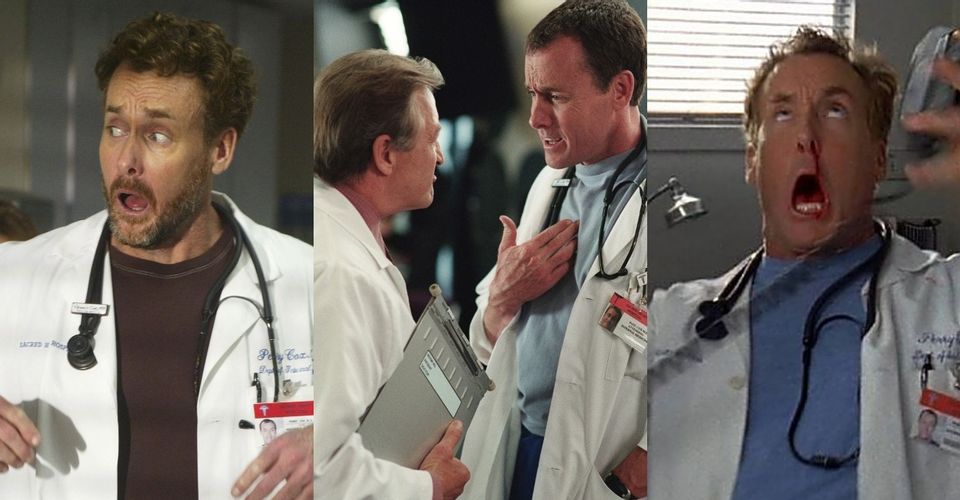Scrubs: Dr Cox’s 5 Best Pieces Of Advice (& His 5 Worst)

Percival Ulysses “Perry” Cox, otherwise known as Dr. Cox, is the aggressive, egocentric epitome of the anti-hero archetype. In the hospital sitcom Scrubs, he is an antagonistic mentor to protagonist J.D., as well as a deeply disliked and respected medical professional to most of his fearful colleagues.
Prone to self-sabotage, angry outbursts, and cruelly-worded quips, it is no surprise that Dr. Cox should be the deliverer of so much demeaning and debatable advice. These more controversial opinions are balanced by trailed-and-tested knowledge borne from years of experience in the medical field. Either way, the never-ending assailment of solicited and unsolicited advice that comes from Dr. Cox is an insight into his core values and complexity as a character.
10 Worst: “Lady, People Aren’t Chocolates. Do You Know What They Are Mostly? B*****ds.”

Dr. Cox’s distaste for the general population is evident from episode one, but this quote from “My Common Enemy” denotes a time in which he turned this problematic philosophy into life advice. He extends the sentiment to an optimistic psychiatrist, Molly, who believes that everyone has a “creamy center.” From this moment, Cox is determined to prove Molly wrong and shatter her endearing idealism. Even more troublesome, Cox’s words seem to condemn his ill-treatment of others; an instinct that only upsets those around him and isolates him even further.
9 Best: “You Only Have To Answer To One Guy, Newbie, And That’s You.”

In “My Fifteen Minutes,” J.D. is concerned about impressing in his intern evaluation, which is supposed to be written by Dr. Cox. When Cox dismisses the task and demands that J.D. completes it himself, his insecure and affectionate protégé refuses.
This disagreement inspires some of Cox’s most impactful guidance; advice that resonates with J.D. in ways that go beyond bedside manner and medical know-how. He critiques J.D.’s pursuit of external validation, explaining that the opinions of others are irrelevant and even detrimental to the development of security and self-belief.
8 Worst: “Only The Weak Need Help.”

Like many of Cox’s abrupt conclusions, this advice is uttered at the end of a long and meandering rant. Season three’s “My Lucky Night” is not the first episode in which Cox communicates to J.D. that he isn’t interested in receiving help. His inability to be vulnerable with even his therapist is indicative of how desperately he clutches to self-sufficiency. After applying for the Residency Director position at Sacred Heart, he realizes that this way of life isn’t logical or sustainable. He eventually asks for help, accepting and embracing his so-called “weakness.”
7 Best: “Once You Start Blaming Yourself For Deaths That Are Not Your Fault, My Friend, That’s A Slippery Slope…”

The tear-jerking two-parter from which this advice is pulled humanizes Dr. Cox in a way that viewers could never forget. In “My Lunch,” Dr. Cox tells J.D. that he should never blame himself for the deaths that inevitably transpire within the hospital. Tragically, things go severely awry when Cox makes a choice that leads to the unexpected death of several patients. In this instance, the usually grounded and stoic Cox finds himself unable to take his own advice and spirals into paralyzing guilt. The importance of his words is made abundantly clear by the fallout that proceeds in “My Fallen Idol.”
6 Worst: “The Only Thing Men Actually Care About, As Far As Dating Is Concerned, Is The Chase.”

In the season four episode, “My Faith In Humanity,” Carla actually crowns Cox’s take on relationships as the “worst advice (she’s) ever heard.” His words are a response to Elliot’s relationship complaints, which Cox claims would be unnecessary if she simply ignored the man she’s interested in. Granted, Cox’s advice works, but only in the short-term.
His claims are characteristically reductive, making assumptions about men that only derive from his personal experience. What’s more, his unwavering stance on what men do and do not care about conflicts with his own behavior, particularly in regards to his relationship with Jordan.
5 Best: “You Can’t Tell Other People How To Feel.”

The sudden death of Laverne Roberts in season six has a different effect on everyone at Sacred Heart. As someone who had known and loved Laverne for a long time, Carla was especially sensitive in the wake of her passing. In “My Words Of Wisdom,” Carla expresses to Dr. Cox that she is disturbed by how quickly people seemed to have recovered from the loss as they fall easily into old routines. Cox candidly disagrees with her, explaining that everyone grieves differently. Once Carla has this realization herself, she finds it easier to accept the behavior of her colleagues.
4 Worst: “Be A Man.”

Throughout the series, Cox regularly hurls crass and creative insults towards his co-workers, with J.D. bearing the brunt of this abuse. While many of these insults are funny, they are symptomatic of a larger theme that is concerning. With varying degrees of seriousness, Cox constantly implies that J.D. isn’t as masculine as he should be and implores him to “grow a pair.” This is harmful advice for such an impressionable person, especially since J.D.’s relationship with masculinity is much healthier than Cox’s.
3 Best: “You Gotta Accept That Everything We Do Here, Everything, Is A Stall.”

Scrubs is known for having some truly heart-wrenching episodes, and “My Old Lady” is a perfect example. Still early in his medical career, J.D. is baffled by an elderly patient who, despite having a happy and fulfilling life, decides to refuse life-saving treatment. While the patient herself is the person to trigger J.D.’s reconceptualization of death, he learns this lesson with assistance from Dr. Cox. The advice from his mentor helps him to overcome his fear and accept the reality of his role as a doctor.
2 Worst: “Keep All Of Your Feelings Bottled Up Inside Where They So Belong.”

A picture of toxic masculinity, Dr. Cox has an extreme fear of vulnerability that often manifests in his treatment of J.D. In the season one episode “My Old Man,” he discourages J.D. from speaking about his strained relationship with his father, encouraging him to “do the healthy thing” and keep quiet. While Cox is self-aware enough to know that this is the opposite of what most people would recommend, it is clearly a philosophy that he stands by.
Predictably, the following seasons reveal that this outlook can’t possibly lead to good things. Dr. Cox has to abandon this ideology to truly thrive and find happiness.
1 Best: “Wherever You Go In Life, Keep Your Eye Out For Johnny The Tackling Alzheimer’s Patient.”

Most of Cox’s most memorable counsel pertains to the role of a medical professional, or perhaps that of a father, husband, or friend. The other significant sub-category of Cox’s recommendations is, of course, his sarcastic advice. In the case of Johnny the tackling Alzheimer’s patient, Cox’s recommendation falls somewhere in between—genuine, follow-able guidance given for pure entertainment value. This line from the episode “His Story” launches a delightful ongoing gag, and provides J.D. with advice that would be extremely helpful if he were ever able to remember it.
About The Author

















